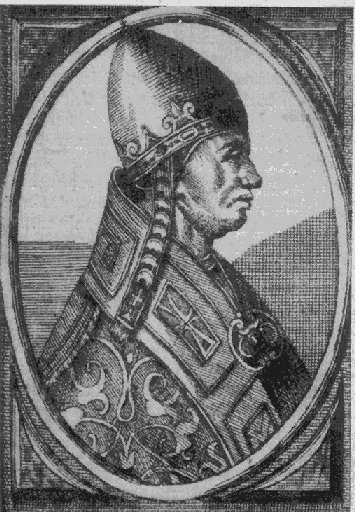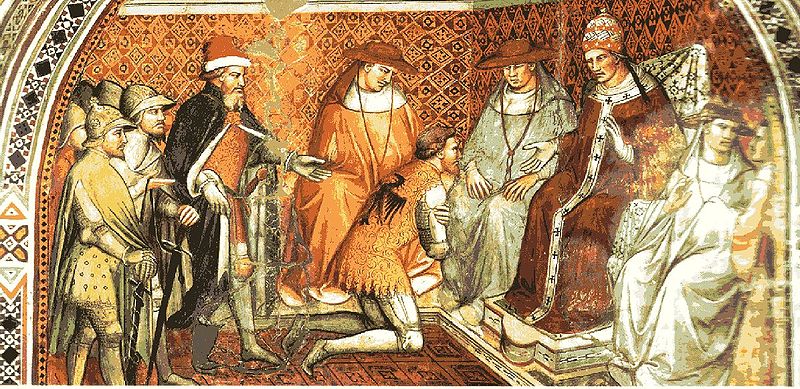<Back to Index>
- General Assembly The Diet of Roncaglia, 1158
- Pope Alexander III, 1100
PAGE SPONSOR

The Diet of Roncaglia was held in 1158 near Piacenza as a general assembly of the nobles and ecclesiasts of the Holy Roman Empire and representatives of each of the fourteen Lombard League cities.
It followed a series of raids carried out by the forces of Frederick Barbarossa in Italy, which forced the submission of the leading city of Milan. The Emperor wished to establish his rights as feudal sovereign in the face of the growing independence of trading cities, which had won charters of municipal privilege during the earlier periods of strife between Papacy and Empire.
The determination of the respective rights of the parties was left to four jurists from Bologna, the home of the great law school founded in 1088. The lawyers' decision favored the emperor, judging that his rule was by divine right, thus restoring the Imperial rights established since the period of nascent trade under rule of Emperor Otto. The lawyers proceed to define taxes, tolls, and exactions of various kinds to be imposed on trade.
The Lombard cities would not accept the verdict, and it had to be enforced by war. Imperial forces dominated prior to the true unification of the Lombard League, and the city of Milan was razed to the ground in 1162. But the cities came to understand the value of a proper alliance post destructionem Mediolani ("after the destruction of Milan"). The decisive battle in the continuing struggle was the Battle of Legnano in 1176, where Frederick was defeated, and later forced to renege his rights of sovereignty.

Pope Alexander III (c. 1100/1105 – 30 August 1181), born Rolando (or Orlando) of Siena, was Pope from 1159 to 1181. He is noted in history for laying the foundation stone for the Notre Dame de Paris.
He was born in Siena. From 14th century he is referred to as a member of the aristocratic family of Bandinelli, but this is not proven. For a long time, scholars believed him to be identical with the 12th century canon lawyer and theologian Master Roland of Bologna, who composed the "Stroma" or "Summa Rolandi" — one of the earliest commentaries on the Decretum of Gratian — and the "Sententiae Rolandi", a sentence collection displaying the influence of Pierre Abélard.
In October 1150, Pope Eugene III created him cardinal deacon with the Title of Santi Cosma e Damiano. Later he became cardinal priest with the Title of St Mark. In 1153, he became papal chancellor and was the leader of the cardinals opposed to German Emperor Frederick I Barbarossa. He negotiated the Treaty of Benevento, which restored peaceful relations between Rome and the Kingdom of Sicily.
On 7 September 1159, he was chosen the successor of Pope Adrian IV. A minority of the cardinals, however, elected the cardinal priest Octavian, who assumed the name of Victor IV and became the German Emperor's antipope. The situation was critical for Alexander III, because according to many chronicles of the time (perhaps exaggerating), Barbarossa's antipope received the approval of most of the kingdoms of Europe, with the exception of the kingdoms of Portugal, Sicily and Spain. However, in 1161, King Géza II of Hungary signed an agreement and recognized Alexander III as the rightful pope and declared that the supreme spiritual leader was the only one who could exercise the rite of investiture. This meant that Alexander's legitimacy was gaining strength, as soon proved by the fact that other monarchs, such as the king of France and King Henry II of England, recognized his authority.
However, the dispute between Alexander III, Antipope Victor IV and his successors Antipope Paschal III and Antipope Calixtus III (who had the German imperial support) continued until Frederick Barbarossa's defeat at the Legnano in 1176, after which Barbarossa finally (in the Peace of Venice of 1177) recognized Alexander III as pope. On 12 March 1178 Alexander III returned to Rome, which he had been compelled to leave twice: the first time between 1162 and 23 November 1165, when he was sent into exile in Campania by Oddone Frangipane following his brief arrest and detainment, and again in 1167. The first period he spent in France, the latter chiefly in Gaeta, Benevento, Anagni and Venice.
Alexander III was the first pope known to have paid direct attention to missionary activities east of the Baltic Sea. He had created the Archbishopric of Uppsala in Sweden in 1164 probably at the suggestion of his close friend Eskil, Archbishop of Lund - exiled in Clairvaux, France, due to a conflict with the Danish king. The latter appointed a Benedictine monk Fulco as a bishop in Estonia. In 1171, Alexander became the first pope to address the situation of the Church in Finland, with Finns allegedly harassing priests and only relying on God in time of war.
In March 1179, Alexander III held the Third Council of the Lateran, one of the most important medieval church councils, reckoned by the Roman Church as the eleventh ecumenical council. Its acts embodied several of the Pope's proposals for the betterment of the condition of the Church, among them the law requiring that no one could be elected pope without the votes of two - thirds of the cardinals. The rule was altered slightly in 1996, but was restored in 2007. This synod marked the summit of Alexander III's power.
Besides checkmating Barbarossa, Alexander humbled King Henry II of England for the murder of Thomas Becket in 1170, to whom he was unusually close. Nonetheless, he confirmed the position of Henry as Lord of Ireland in 1172.
Through the Papal bull Manifestis Probatum, issued on May 23, 1179, he also recognized the right of Afonso I to proclaim himself King of Portugal – an important step in the process of Portugal becoming a recognized independent Kingdom (Afonso had been using the title of King since 1139).
Even as a fugitive, Alexander enjoyed the favor and protection of Louis VII of France.
Nevertheless, soon after the close of the synod, the Roman Republic forced Alexander III to leave the city, which he never reentered, and on 29 September 1179, some nobles set up the Antipope Innocent III. By the judicious use of money, however, Alexander III got him into his power, so that he was deposed in January 1180. In 1181, Alexander III excommunicated King William I of Scotland and put the kingdom under an interdict.
He died at Civita Castellana on 30 August 1181.
